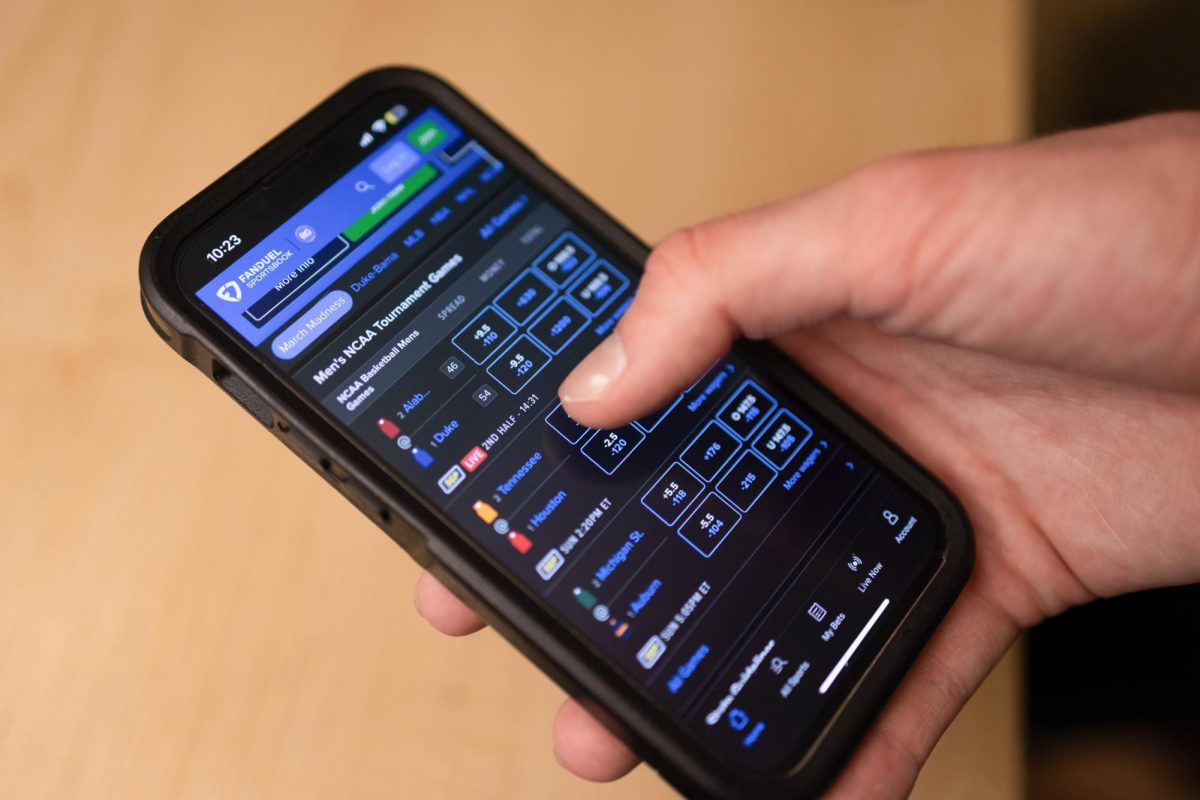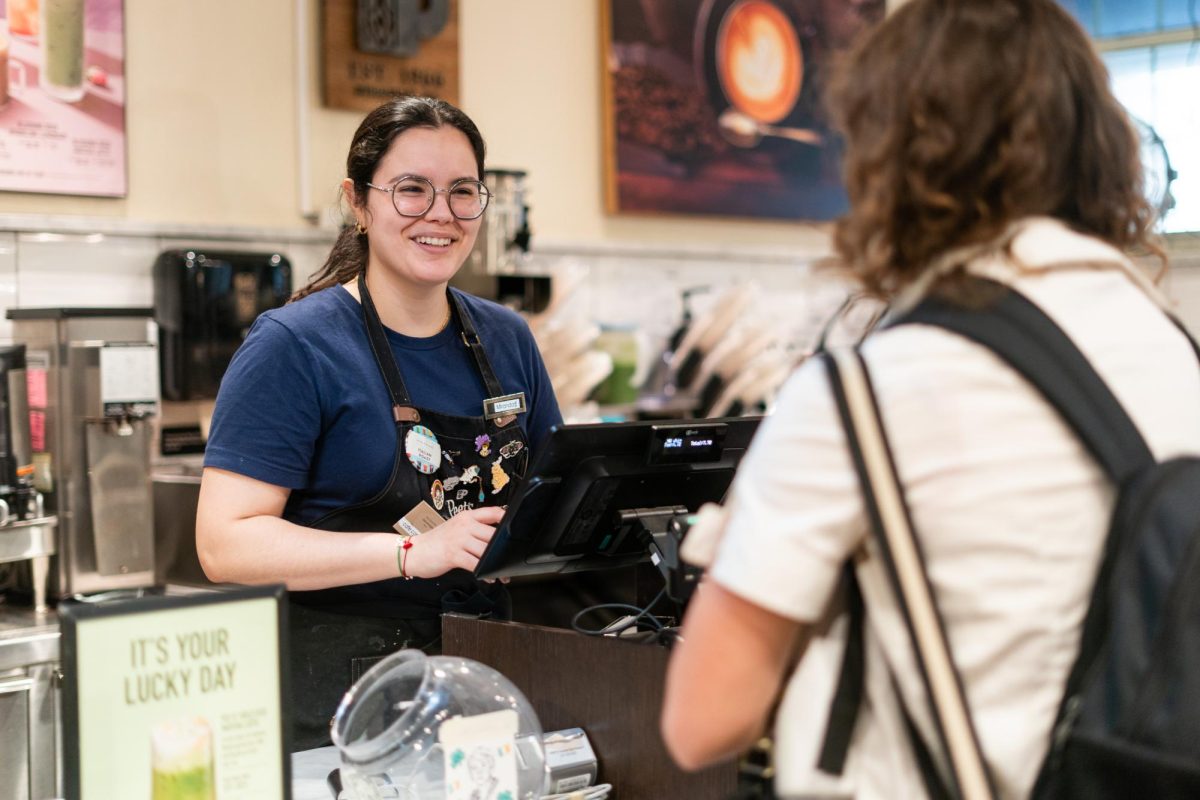While college basketball players are busy hitting threes in the latest March Madness matchups, students watching from home are praying for their parlays to hit.
Deregulation and app developments have propelled sports betting to new heights in recent years, driving many college students to spend their time winning and losing money by placing bets from the digital comfort of their phones. From high rollers to casual bettors to gambling critics, students say sports betting has hooked many college students and urge young adults to educate themselves about the mental health consequences and addiction risk posed by gambling.
Sports betting is currently legal in 38 states and the District. Legalization of sports betting expanded across the country in the wake of a 2018 Supreme Court decision that allowed for legal sports gambling outside of Nevada, leading to the proliferation of apps in the United States.
The same year, the D.C. Council legalized sports betting for all residents and visitors 18 years or older, making the District one of the only places — besides Kentucky, New Hampshire, Rhode Island and Wyoming — where the legal age for sports betting is 18.
A 2023 NCAA study found that more than two-thirds of 18 to 22 year olds on college campuses have bet on sports. This year, Americans are expected to collectively bet an estimated $3.1 billion in legal wagers on the March Madness tournament.
“I’d say it started from the peer pressure and then thinking that I’m smarter than them,” said Iko Kontselidze, a first-year studying finance.
He said he started sports betting at the age of 17 when he felt persuaded by his close friends who were already dabbling in online gambling. Kontselidze’s friends would ask him for money to bet on a game together, but he’d often disagree with their gambling decision-making — leading him to make solo bets, he said.
Now, Konteslidze said he mostly bets on soccer games once or twice a month, focusing on championship games. He said he typically uses a VPN to hide his IP address and access the banned cryptocurrency-based prediction market app Polymarket, which allows users to bet on the outcome of a variety of sport games and other real-world events, from whether or not the United States would ban TikTok to when Taylor Swift will get engaged.
Polymarket has blocked access to American consumers since 2022, following a settlement in which Polymarket paid the Commodity Futures Trading Commission $1.4 million dollars due to allegations that the app ran an illegal, unregistered platform for trading options contracts tied to real events.
The app has drawn criticism in recent months for allowing users to bet on the 2024 presidential election and the number of acres of land that would burn in the Palisades fire in January.
Kontselidze said his biggest win and biggest loss occurred on back-to-back weeks earlier this month, when he bet $40 on a Liverpool and Paris Saint-Germain matchup, won $200, put down the same $200 on another Liverpool and Paris Saint-Germain game the next week and lost the $200 altogether.
This experience taught Kontselidze about the “rabbit hole” sports betting can become when you don’t place value on the money used to place bets, he said.
“You don’t think about your losses. You think about your wins,” Kontselidze said. “When you win 20 bucks then you feel like that 20 bucks is now free, so you’re gonna bet that.”
He said his back-to-back win and loss was a “learning experience” to be more responsible with his betting and to know when it’s time to cash out. He said he has not personally experienced sports betting addiction and tries to keep an optimistic perspective when his bets don’t work out.
“I try not to think about mental health that much,” Kontselidze said. “So I would say, I could be sad for two minutes, but then I would say, life moves on. It’s just a game. It’s just money.”
Kirby Keas, a first-year studying international business, said he was first introduced to sports betting through filling out Super Bowl squares — a classic betting game where people pay for squares in a table of 100 where each corresponds to the final digits of the teams’ scores — with his friends and family while growing up in Texas.
Now that he’s in college, Keas said he still sticks to “little bets,” paying $10 for a Super Bowl square or on the outcome of a basketball game or an Ultimate Fighting Championship fight.
“I’m not a big fan of gambling,” Keas said. “It’s pretty dirty in my opinion. But I think 5 or 10 bucks is just an easy way to get more involved in the game.”
Keas said he will consult sports media outlets like ESPN before placing bets on sports he doesn’t follow closely and go off prior knowledge when betting on sports he is consistently invested in, like UFC.
He said he stays away from using any of the sports betting apps, preferring to make wagers with a friend or family member because it’s a more intimate experience.
“I kind of like to keep it more personal than go to apps and whatnot,” Keas said. “It’s like nobody’s really trying to get money from you, you know what I mean? It’s just a way to feel a little bit more excitement about it.”
A first-year majoring in political science and international business who requested anonymity due to fear of judgment for his gambling, said he started sports betting in high school with his friends, placing wagers on their favorite teams. He said that in college, he bets “every now and then” and primarily uses the app DraftKings to bet on soccer and basketball games, especially on his favorite basketball team, the New York Knicks.
He said there should be more education and regulations on sports betting but was unsure how the government could enact them as sports betting apps also “want” users to become addicted to turn more profit. The risk of developing an addiction to sports betting is “dangerous,” especially as people start chasing their losses by betting more and more to make up for the money they’ve lost, he said.
“They’re betting money they don’t have, and they bet more and more to regain it,” he said. “You’re putting yourself into a hole.”
Students who don’t bet on sports reported concern over their peers’ normalization of the pastime and the ramifications of gambling on young adults’ mental health and sports culture.
Senior Julia Yang, a psychology student, said she is not completely opposed to sports betting, but she does not enjoy the “mood swings” that its highs and lows spur in her boyfriend.
“He sports bets, and sometimes he’ll win and it’ll be great and we’ll go out to dinner and he’ll be in a really good mood but then when he loses he’s just kind of really upset all day, and that just kind of ruins my day,” Yang said.
Lily Legere, a first-year studying international affairs, said the everyday accessibility of sports betting through gambling apps and websites has made the practice more “normalized” than traditional forms of gambling, like betting at a casino, and attracts younger users who are more active on their phones like her family members.
“I know even just my brother was never really into football, and now he watches football all the time to see if his parlays hit,” Legere said.
Legere said there should be more people, specifically in the sports industry, who use their social media platforms to educate young people on the risks of sports betting addiction and encourage responsible gambling.
“If there were people and role models that they looked up to, and maybe people who were in sports in general, if they were spreading the message that kind of warned against or warned for the use of responsible sports betting instead, that might be somebody they listen to,” Legere said.








